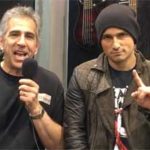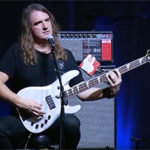Trivium bassist talks new record and making the most of the current world situation
Exclusive interview with FBPO’s Jon Liebman
May 4, 2020
Photo by Jake Owens
Paolo Gregoletto is best known as the bassist for the Florida-based metal band, Trivium, which also includes Matt Heafy (vocals, guitar), Corey Beaulieu (guitar), and Alex Bent (drums). Gregoletto, who is also a guitarist, vocalist and songwriter, talked to us about What The Dead Men Say, Trivium’s 9th album, which was released April 24 on Roadrunner Records.
FBPO: Congratulations on the new record.
Paulo: Thank you very much!
FBPO: I gotta tell you, Trivium keeps sounding more and more seasoned as a band, as time goes on. Do you feel that?
Paulo: Yeah. I think every time we go in to make a new record, we’re definitely trying to step up all the aspects of it, from the production to the songwriting. I’m glad people are feeling like we’re getting better as we keep going, so that’s a good trajectory for us.
FBPO: I read a quote from Matt Heafy, where he said, “We make our best records when we write the kind of music we feel is missing.” What did he mean by that?
Paulo: When we’re listening to what’s coming out, not in a negative way to take away from other bands are doing, but we try to see where Trivium fits in the equation of modern metal music coming out. With Trivium, it’s our balance of melody and the extreme that makes our band, and finding that right balance. When I listen to a lot of the newer metal stuff that comes out, there’s a ton of extreme stuff, and there’s a lot of melodic stuff. I feel like we’re right down that middle lane with our sound. So, it’s really just going in and writing the best riff, and then coming in and jamming on it. It’s hard to say, “This is exactly the formula we use to get a song,” because every song has a different story, a different start and end.
FBPO: The material for this album was impeccably rehearsed before the band even went into the studio. That must have made the recording process a lot smoother and easier.
Paulo: Yeah, that’s something we’ve just drilled into ourselves. Anytime we go on tour or go into the studio, we rehearse a ton. We never like going in and not being prepared. We learned the hard way back in the beginning that you can’t just go in and think you’re going to knock out a record, or go on tour and not put in the time beforehand.
FBPO: You personally did a lot or writing for this album, both music and lyrics. Is there an underlying message you wanted to get across as a band with this new record?
Paolo: On the lyrical side, it’s kind of a mix of me, Matt, and Corey bringing in all the stuff. Sometimes Corey will have a title on a demo that’s awesome and we’ll keep the title and I’ll just write lyrics to that. Or maybe Matt has a lot of lyrics already written and I’ll come up with a chorus. Or I’ll come up with a lot of the lyrics, or whatever. We’ve never had an album where it’s like, “This is the message of the record and we’re going to write towards that.” We let it happen naturally. It might be inspired by personal events, or it could be just taking in events around the world. There’s no shortage of crazy, wild, angering things happening, especially for a metal band. If you’re paying attention, there’s more than enough material to fill every album you make. So that’s really how we start with that stuff. I always keep my eyes out for any stories that appeal to me or just resonate with me.
FBPO: Tell me about your gear.
Paolo: I’ve been playing Warwick (basses) for a couple years. With the record, essentially, it is exactly what I play live. In the studio, I use my actual Kemper amp from touring, with my Warwick. And I have an EBS pedal that runs before it, a compressor, and that was really it for the studio. There was no real crazy stuff. It’s just kind of the meat and potatoes of making a good tone. And of course running it through good DIs and good pre-amps in the studio gets you what you need for bass.
FBPO: Which Warwick are you playing? Are you still playing the Corvette?
Paolo: Yeah, I play the Corvette Double Buck.
FBPO: What kind of strings?
Paolo: I use the Dunlop Super Bright, 45 to 130.
FBPO: Any other effects outside of the EBS pedal?
Paolo: Yeah, I have a Darkglass Duality Fuzz pedal I use for key parts in a few songs. It’s by far it’s the best distortion pedal I’ve played for bass. And I’ve got the Dunlop “wah” pedal, the classic white one, in my rig when we’re playing songs where I need it.
FBPO: Let’s talk about your bass technique. I know you started out as a fingers player. How much are you playing with your fingers compared to a pick?
Paolo: The only time I ever played with a pick was when I first joined Trivium because there were a lot of triplets. I didn’t have the three-finger triplet thing down, so I switched to a pick. And I did my first record with the band, Ascendancy, with a pick. Then as I started touring a lot more, I just kind of added the fingerstyle back into the band playing live. Once I got the three-fingers thing down, I switched from the pick. I think the one really good thing about playing with a pick is that it got my ears attuned to the sound of it. I always wanted to match my tone of playing with a pick to playing with my fingers, so I added in a lot more mids and highs to kind of get that punchiness. That really affected how my tone has sounded to this day.
FBPO: What advice can you impart to our students who are learning bass online right here at forbassplayersonly.com? What do you think is important for someone who wants to learn bass?
Paolo: It’s important, no matter what instrument, to start off learning every little simple thing before you get to that next step, never trying to rush too far into techniques before you’ve mastered something. If you start too soon to go to something a lot more technical, you’re not going to be able to play it right. You’re taking shortcuts that are going to affect you and you’re going to pick up a lot of bad habits along the way. Once you have a bad habit, it’s very hard to break those things. That, to me, has always been the thing. You’ve got to really get the fundamental stuff down first, and don’t shortcut it. Give yourself a year, if you’re just starting, to really get those down before you try to dive into the deep end.
FBPO: Some of the band’s touring plans had to be put on hold in light of the current world situation. What do you foresee for the future, when things start to pick up again?
Paolo: Well, of course we had to cancel our tour in Asia a few weeks ago, right when everything was getting bad. And we have a tour this summer, which is still on, with Megadeth, Lamb of God, and In Flames, but of course everything’s tentative and subject to change as things kind of change around the world. I think we’re in a good spot as a band where we can kind of ride this out. It’s probably going to be a little longer than we’d hoped, but hopefully by the fall things will get into whatever the new normal will be and we can continue to tour. We’re probably going to be doing a little bit more streaming show type stuff, but that really comes down to me and Alex, who lives out of state – he lives in California – all of us being able to come together and rehearse in a room. We’d be able to stream shows really easily because we’ve been doing that for the last three years. Once we can at least get to that point, streaming shows is probably going to be the thing we do until we get back on tour.
FBPO: What’s been keeping you busy in the meantime?
Paolo: With the new record, we’ve had a ton of press. Matt and I were supposed to go to Europe for press, but we had to cancel that, so pretty much it’s been three or four weeks straight of just press. Of course Matt has his Twitch channel, which is something he does pretty regularly. And then for me, you know, I’ve just been hangin’ at home, enjoying the extra time with my girlfriend and our two dogs, and making the best of the situation, even though everything’s kind of been put on hold.
FBPO: What would you be if you weren’t a bass player?
Paolo: I would definitely try to stay in the music industry. It would either be with production of records, or maybe on the management side. Thankfully the band has been going strong, getting bigger and better, so hopefully I can keep doing this for a long time to come.
See Jon’s blog, with key takeaways from this interview, here.
What The Dead Men Say is available here:





